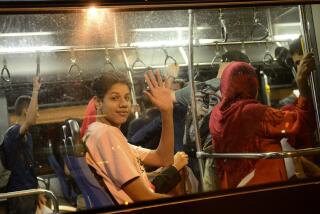With Mosul Now Calmer, Fighting Flares Elsewhere
- Share via
MOSUL, Iraq — Relative calm returned to Mosul on Wednesday, but Iraq’s tenacious insurgency continued to flare across the country, with bombings and firefights claiming lives from the northern town of Baiji to the western city of Ramadi.
Armed clashes and a car bombing in increasingly violent Baiji killed about 10 people and wounded 20, while battles between insurgents and U.S. troops left as many as nine people dead in Ramadi, in the so-called Sunni Triangle.
The continuing clashes come in the wake of the U.S.-led offensive to take back control of onetime insurgent stronghold Fallouja, about 35 miles east of Ramadi, and more recently to quell violence in Mosul.
The latest violence also comes amid conflicting reports of the possible kidnapping of more than 30 newly trained police recruits this week in a town near the Jordanian border.
In Mosul, a multiethnic city 225 miles north of the capital, residents reported comparative tranquillity after a violent week during which armed militants routed local security forces and temporarily took control of several police stations and bridges.
In response, Iraqi security troops were redeployed from the Syrian border and a Marine battalion was dispatched from Fallouja.
The combined force of about 2,800 soldiers launched an offensive Tuesday to reclaim insurgent-held sections of Iraq’s third-largest city.
By Wednesday, the troops largely controlled Mosul, as elements of normality began to return.
Residents, who had spent the last week indoors due to fears of violence and a 4 p.m. curfew, began emerging from their homes, and several wedding parties filled the streets with light and noise. Normally, a rash of weddings would have begun Monday, following the traditional moratorium during the Muslim holy month of Ramadan.
Despite the festivities, mild violence and a low-level sense of siege still held sway. Insurgents fired several mortar rounds Wednesday morning at the Ahrar police station, witnesses said. The station was empty at the time, and no casualties were reported.
Four of the city’s five main bridges were closed, and the fifth was open only to pedestrian traffic.
Last week’s Mosul flare-up seemed calculated to open a second front in the insurgent struggle against American and Iraqi government forces, just as they were retaking the center of Fallouja.
With Fallouja -- long believed to be a staging ground for attacks across the country -- largely back under the control of U.S. and Iraqi government forces, Iraq’s insurgency threatens to morph into a mobile series of shifting brush fires.
The newest hotspot may be Baiji -- between Baghdad and Mosul and home to the nation’s largest oil refinery and a major power plant.
Recent unrest in Baiji forced the temporary closure this week of the only major highway linking Baghdad with Mosul.
On Wednesday, a suicide bomber detonated his car alongside a U.S. convoy, killing about 10 people and wounding 12, including three American soldiers.
In Ramadi, up to nine people were killed and 13 wounded in a lengthy gun battle between insurgents and U.S. forces, according to news reports.
Meanwhile, there were contradictory reports about a group of Iraqi police officers allegedly kidnapped by insurgents earlier in the week after returning from training in Jordan.
Some news reports described an assault by armed insurgents on the hotel where the officers were staying in the town of Rutba, about 75 miles from the Jordanian border.
But the reports varied on the number of officers abducted, the day they were taken and whether the group had been released or even if the incident had happened.
None of the details could be independently verified, and an Associated Press report cited an Iraqi Interior Ministry official as saying that the officers in question had not yet returned from Jordan in the first place.
In Baghdad, interim Prime Minister Iyad Allawi’s office said he was “very concerned” over the shooting of a wounded and apparently unarmed insurgent by a U.S. Marine in a Fallouja mosque.
The incident, captured on film by an NBC news crew traveling with troops, has sparked a fierce reaction in the Arab world.
The U.S. military has announced an investigation of the shooting, and Allawi’s office released a statement saying he had discussed the matter with top U.S. ground commander Gen. George W. Casey and warning against a rush to judgment.
“Gen. Casey has assured the prime minister that an urgent inquiry is underway, and that he will share its findings with the Iraqi government in full and with complete transparency,” the statement said.
“Unlike others, the prime minister will await the outcome of the investigation before commenting any further on this incident.”
U.S. Ambassador John D. Negroponte said the shooting was not “in any way a reflection on the quality and caliber of absolutely fine young servicemen and women we have serving here in Iraq.”
Meanwhile, the total U.S. military death toll in Iraq has now exceeded 1,200, based on Defense Department casualty reports Tuesday and Wednesday.
Times staff writer Khalil reported from Amman, Jordan, and special correspondent Ahmed from Mosul. Times wire services were used in compiling this report.
More to Read
Sign up for Essential California
The most important California stories and recommendations in your inbox every morning.
You may occasionally receive promotional content from the Los Angeles Times.













